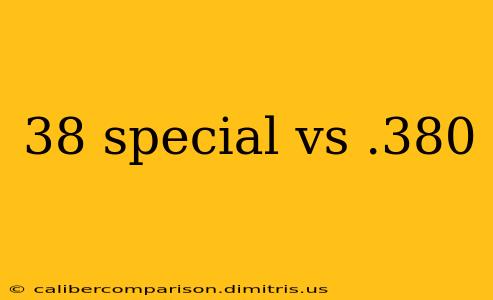Choosing the right caliber for your handgun is a crucial decision, impacting everything from self-defense capabilities to target shooting accuracy. Two often-compared calibers are the venerable .38 Special and the more modern .380 ACP (Automatic Colt Pistol). While both share a similar name and are relatively small, their performance characteristics and applications differ significantly. This in-depth comparison will help you understand the nuances of each round to make an informed choice.
Understanding the Fundamentals: .38 Special
The .38 Special is a classic revolver cartridge, renowned for its reliability and stopping power. Developed in 1898, it's seen decades of service in law enforcement and civilian contexts. Key features include:
- Power: Generally considered a more powerful round than the .380 ACP. It delivers greater muzzle energy and penetration, making it more effective against larger threats.
- Recoil: The increased power translates to noticeably higher recoil compared to the .380 ACP. This can make it less comfortable for new shooters or those with smaller hands.
- Ammunition Variety: Offers a wide range of ammunition types, including lead-round-nose, jacketed hollow-point (JHP), and +P (pressure) rounds, providing versatility in load selection for different purposes.
- Platform: Primarily used in revolvers, although some semi-automatic pistols also chamber this cartridge.
Advantages of .38 Special:
- Stopping Power: Superior stopping power makes it suitable for self-defense scenarios.
- Penetration: Greater penetration capabilities are effective against barriers.
- Ammunition Availability: Widely available and relatively inexpensive.
Disadvantages of .38 Special:
- Recoil: Strong recoil can be challenging for some shooters.
- Capacity: Revolvers generally have a lower ammunition capacity than semi-automatic pistols.
Deciphering the Details: .380 ACP
The .380 ACP (also known as 9mm Kurz) is a smaller, semi-automatic pistol cartridge. Its smaller size allows for slimmer and more concealable firearms. Key features include:
- Power: Less powerful than the .38 Special. While still capable of self-defense, its stopping power is generally considered lower.
- Recoil: Significantly less recoil than the .38 Special, making it more manageable for novices.
- Ammunition Variety: A good selection of ammunition types is available, including JHP and full metal jacket (FMJ) rounds.
- Platform: Primarily used in semi-automatic pistols.
Advantages of .380 ACP:
- Concealability: Smaller size allows for easy concealment in various carry methods.
- Recoil: Low recoil promotes easier handling and faster follow-up shots.
- Capacity: Semi-automatic pistols offer higher ammunition capacity compared to revolvers.
Disadvantages of .380 ACP:
- Stopping Power: Lower stopping power compared to the .38 Special.
- Penetration: Penetration capability is less than the .38 Special.
The Verdict: Which Caliber is Right for You?
The "better" caliber depends entirely on your individual needs and priorities.
-
Choose .38 Special if: You prioritize stopping power and penetration, don't mind higher recoil, and prefer the reliability of a revolver. This is a strong choice for home defense or situations requiring greater stopping power.
-
Choose .380 ACP if: Concealability is paramount, recoil management is a key concern, and you value higher ammunition capacity. This is an excellent option for concealed carry where ease of use and smaller size are essential.
Remember, responsible firearm ownership involves thorough training and understanding of your chosen firearm and cartridge. Consult with experienced firearms instructors and professionals to determine the best caliber for your specific needs and circumstances. This information should not be considered a substitute for professional advice.

